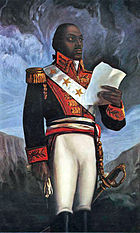Baptist war
| Christmas Rebellion | |||||||
|---|---|---|---|---|---|---|---|
| Part of North American slave revolts | |||||||
 Destruction of the Roehampton Estate, January 1832, by Adolphe Duperly |
|||||||
|
|||||||
| Belligerents | |||||||
| Rebel slaves | |||||||
| Commanders and leaders | |||||||
|
|
Samuel Sharpe | ||||||
| Strength | |||||||
| Unknown | 60,000 | ||||||
| Casualties and losses | |||||||
| 14 killed | 207 killed | ||||||
| North American slave revolts |
|---|
 |
|
The Baptist War, also known as the Christmas Rebellion, the Christmas Uprising and the Great Jamaican Slave Revolt of 1831–32, was an eleven-day rebellion that mobilized as many as 60,000 of Jamaica's 300,000 slaves. It was led by a black Baptist preacher, Samuel Sharpe, and waged largely by his followers.
The missionary-educated rebels had been following progress of the abolitionist movement in London; their intention was to call a peaceful general strike. Compared with their Presbyterian, Wesleyan, and Moravian counterparts, Baptist slaves seemed more ready to take action. This may have reflected a higher level of absenteeism among white Baptist missionaries. The relative independence of Black deacons facilitated slaves taking greater ownership over their religious life, including reinterpretations of Baptist theology in terms of their own experience (for example, they placed an emphasis on the role of John the Baptist, sometimes at the expense of Jesus Christ.)
Thomas Burchell, a missionary in Montego Bay, returned from England following Christmas vacation. Many of the Baptist ministry expected that he would return with papers for emancipation from King William. They also thought that the King's men would enforce the order. Thus, discontent escalated among slaves when the Jamaican governor announced that no emancipation had been granted.
...
Wikipedia
